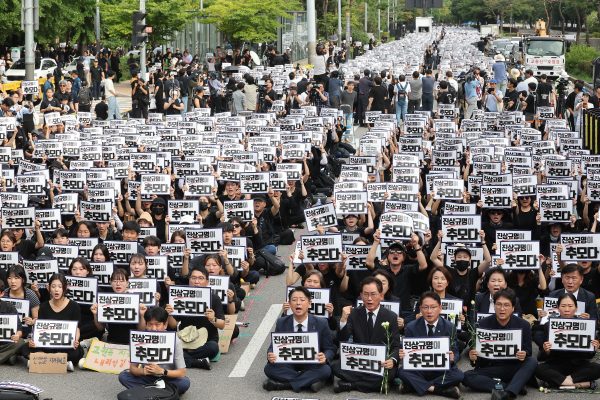But a decade later, the landscape is vastly different. Thousands of schoolteachers have rallied against the South Korean government following the tragic death of a young teacher in July 2023. Having recently been appointed to a primary school in an affluent part of Seoul, the late teacher found herself ensnared in a distressing situation involving a parent accusing her of child abuse. Several teachers across the country have taken their own lives due to conflicts with students and their parents.
In the aftermath of these incidents, teachers across the nation united. Unlike past protests, which were often orchestrated by teacher associations or labour unions, these demonstrations saw many teachers voluntarily participate, share information and gather regularly. Their demands centred around enhanced protection at their workplaces. They called for amendments to the Child Welfare Act and the ability to discipline students without fear of facing child abuse accusations.
About a month after the teacher’s death, the Ministry of Education released a set of legal amendment proposals to help alleviate teachers’ worries. The legislature is also swiftly enacting legal reforms to establish an improved foundation for teachers to educate their students with the confidence that they will be protected if any disputes arise.
In September 2023, the National Assembly unanimously passed legislative amendments that included provisions that restrict the dismissal of teachers without justifiable reasons if abuse allegations arise. It also included measures for parents who interfere with educational activities to receive special training, with fines imposed if they fail to comply. Still, teachers continue to demand more concrete measures for protection, such as the ability to file criminal charges against parents if their child abuse report results in acquittal.
But what matters more is looking at the underlying causes that drove South Korea’s ‘nation builders’ to engage in this movement. This crisis has resulted from the long-standing clash between teachers’ rights to educate and discipline, students’ rights and parents’ rights to protect their children. In this dilemma, teachers have emerged worse off.
Over the last fifteen years, there has been a decline in public confidence in the country’s education system and private education has become increasingly popular.
As parents seek to give their children an advantage within an already competitive education culture, education has been transformed into a commoditised service. Teachers have become service providers and are even subjected to ratings by students and parents. Parents who now typically raise only one or two children and as a result tend to overprotect their children, becoming extremely concerned if they believe their child has been unfairly treated by teachers.
Poor quality of teaching and unethical practices, particularly in public schools, in the past partially explains the decline in public confidence. The rapid increase in teacher numbers during the post-Korean War education boom led to an influx of unqualified instructors, some of whom engaged in abusive practices. The students who experienced this have now grown up to become parents. Possibly as a result of these memories, the due respect that was once immediately afforded to teachers based on Confucian ideas, has lost its ground.
The end goal of education is typically admission to prestigious universities. In an increasingly stratified education system and a prestige-driven hierarchy of higher education, students and parents are tempted to downplay the importance of a holistic learning experience at primary and secondary levels. Amid this backdrop, teachers are increasingly seen not as educators but as graders, instrumentalised within a public education system geared towards university admission.
But because the government rushed to address the concerns of upset teachers, few of its proposals address these core issues or consider how to recover public trust in the education system.
To re-establish social trust, the government should formulate and implement a comprehensive consensus-building process and framework. Unlike other service-oriented sectors, education requires a longitudinal perspective, where the cultivation of knowledge and values is a gradual process. But South Korea has demonstrated a proclivity for frequent educational policy modifications, which often reflect the prevailing political inclinations, and this has contributed to diminished public confidence.
A more sustainable approach will require a re-evaluation of the pervasive culture of intense competition in the education system and a concerted effort to rekindle trust among educators, parents and students.
It is essential to recognise that education, particularly in East Asia, transcends the boundaries of formal contractual agreements formulated within legal or regulatory frameworks. The primary purpose of school education should not be solely to facilitate entry into prestigious universities — but this perspective warrants a significant shift in the collective consciousness of South Korean society.
Kyuseok Kim (Mick) and Eunyoung Shin are PhD students in the Department of Education at Korea University.

